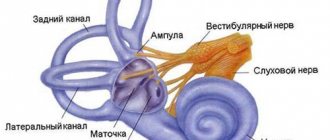Migraine is a chronic neurological disease, the main symptom of which is headache of varying duration and intensity. Regular manifestations of the disease can significantly reduce a person’s quality of life. Each patient with this diagnosis should know how to quickly relieve migraine pain, what first aid methods can be used during the development of an attack, and how to reduce the frequency of exacerbations. Modern pharmacology offers several groups of medications that can alleviate the patient’s condition. Migraine tablets are prescribed by a doctor based on the patient’s age and the specifics of the case.
Medicines for the treatment of headaches
Migraine medications are divided into three groups:
- symptomatic - with their help they relieve nausea, vomiting and other associated symptoms;
- abortive - designed to eliminate the headache attack itself;
- preventive - these drugs prevent the occurrence of further attacks.
Each group has its own specific migraine pills, a list of which we offer you.
Symptomatic medications
The action of symptomatic drugs for migraine is aimed at eliminating weakness, vomiting and nausea.
Drugs in this group are available both in tablets and in the form of suppositories (if taking tablets is impossible for the above reasons).
These include:
- Phenergan is an antihistamine that has a pronounced antiemetic, hypnotic and sedative effect;
- Compazine - an active antipsychotic (inhibits the central nervous system) - also stops vomiting and reduces nausea;
- Thorazine - has a depressant effect on the central nervous system, a strong sedative, and in large doses works as a hypnotic.
Their side effects are similar: nightmares, excitability, diarrhea, convulsions, dizziness, loss of orientation.
Abortion drugs
Broad-spectrum painkillers based on analgesics and non-steroidal drugs are used as abortive drugs against migraine
They reduce inflammatory swelling pressing on nerve endings and thereby reduce pain.
These include:
- Amigrenin (tablets, nasal spray) and sumamigren (tablets) - the active substance is sumatriptan, which acts on the smooth muscles of the blood vessels of the brain, reduces the activity of the trigeminal nerve, and constricts the vessels of the carotid arteries. All this stops a painful attack, the drug also eliminates nausea and photophobia, and begins to act 30 minutes after administration.
- Excedrin (caplets - a type of tablet) is a combined pain reliever based on acetylsalicylic acid and paracetamol. According to studies of the drug, after 2 hours, 59% experienced a decrease in pain, and 21% experienced its complete disappearance.
- Relpax (tablets) or eletriptan (international name) - similar in action to amigrenin and sumamigren, but has greater selectivity for serotonin receptors in the carotid arteries than for the same receptors in the coronary and femoral arteries. Relpax narrows the blood vessels of the brain practically without affecting others.
Reviews about migraine pills such as Amigrenin, Relpax and the migraine drug Excedrin are strictly positive in terms of pain relief.
Triptan drugs are also used to treat migraines - all are based on serotonin derivatives and were developed exclusively to combat migraines. A more detailed description of this group will require a separate article.
Preventive medications
Preventive tablets for migraines are prescribed if the patient has attacks more than once a week. Such medications are usually taken every day. They are divided into:
- beta blockers - increase vascular tone;
- Calcium channel blockers - these drugs control the narrowing of blood vessels.
Among the most popular:
- Inderal (beta-blocker) - reduces the strength and frequency of heart contractions, this causes a decrease in blood pressure, available in tablet form;
- Topral (central dopamine D2 receptor blocker) - has an antipsychotic effect and also works as an antidepressant, released in tablets;
- Cardizem and procardia - has antiarrhythmic (normalizes heart rate) and hypotensive (lowers blood pressure) effects, available in tablet and capsule form.
Separately, we can highlight antidepressants - these drugs improve mood, relieve feelings of anxiety and melancholy, normalize sleep and appetite, these include:
- Amitriptyline (tablets, ampoules, injection solution) - its antidepressant effect is accompanied by a pronounced sedative and hypnotic;
- Cyproheptadine (tablets, syrup) - the picture of the drug’s action is similar to the previous one, but all additional effects are less pronounced;
- Preparations based on valproic acid (convulex, depakine, apilepsin) have been used since the late 80s of the last century, but interfere with the synthesis of carnitine (possible liver damage) and sometimes inhibit bone marrow hematopoiesis.
Migraine tablets
When deciding which pills to take for migraines, you should be guided by your doctor’s recommendations, and not by advertising or the advice of friends. Even with a hereditary disease, attacks may occur differently in parents and children, so specific approaches will be required.
When choosing medications for migraines, you need to remember that:
- you may have to try not just one product, but several until you find the right one - even the best headache pills may be useless in a particular case;
- sometimes painkillers for migraines cease to cope with their tasks after a few months of therapy, then they will have to be changed;
- In some patients, the disease can proceed according to different scenarios - for each case, an effective remedy must be selected.
Despite the fact that the list of effective tablets for migraines is impressive, not every patient is able to find something suitable. In difficult cases, only injections will help cope with the attack. Taking into account the increased aggressiveness of such drugs, they must be used carefully, strictly according to the regimen selected by the doctor.
Antispasmodics and analgesics
This group includes the means of the fastest impact. They are recommended to be taken when the first signs of an attack appear. They help relieve or relieve headaches. If there is no effect after 1-2 doses of the medication, carried out according to the instructions, it is better to switch to stronger or specialized drugs.
List of popular fast-acting migraine medications:
- Citramon - helps against the first signs of an attack. Take 1 tablet after meals, up to 3-4 times a day. It is forbidden to drink for more than 3 days, there is a high risk of side effects;
- Aspirin - take 1 tablet up to 3 times a day. The maximum duration of therapy is 14 days;
- Ibuprofen - you are allowed to take 1 tablet up to 4 times a day, with breaks between doses of at least 6 hours;
- Naproxen is a powerful analgesic that is taken once in the amount of 2 tablets;
- Diclofenac - acts as quickly as possible; it is forbidden to take more than 200 mg of the active substance per day;
- Spasmalgon is an effective antispasmodic that is taken symptomatically, but not more than 6 tablets per day;
- No-Shpa can be taken once or taken symptomatically, but the long-term effect of the medicine is not guaranteed. The maximum daily dose is 6 tablets.
It is not recommended to combine these medications on your own. In the absence of a pronounced positive effect, increasing therapeutic doses is prohibited. This approach will not improve the condition, but will increase the risk of adverse reactions.
Triptans
A group of not very popular due to the high price, but effective drugs for the treatment of migraine. They
are able to simultaneously cause vasoconstriction, block the occurrence of pain, and relieve other manifestations of the disease. If there is no effect after the first use of the product, you should not abandon it. Doctors recommend taking the medicine at least three times according to the instructions or medical regimen and only after that making a decision about the advisability of their further use.
The list of drugs effective for migraines includes: Noramig, Relpax, Zomig, Sumatriptan and their analogues. Medicines are available without a prescription and can be used both to relieve attacks and to prevent them. In the latter case, the tablets must be taken within the minimum dose for several weeks. The drugs are contraindicated for people under 18 and over 65 years of age, with high blood pressure, severe pathologies of the heart and blood vessels.
You can learn more about this group of drugs here.
Ergotamines for migraine aura relief
The vasodilating properties of the drugs allow you to quickly relieve discomfort. When taken for a long time, they are addictive, so they can only be used with the permission of a doctor within the recommended doses and treatment regimens. The most popular are: Ergomar, Ginofort, Akliman, Sekabrevin. When choosing a medicine for migraines, you should pay attention to products with added caffeine. Cafergot, Nomigren and Caffetamine act faster, the positive results last longer.
These are effective tablets for migraine attacks, but will not give the desired results for headaches of other etiologies. Today they are used not only to treat attacks, but also to prevent their recurrence. Products are prohibited for use in cases of ischemia, angina, hypertension, and renal failure. They are contraindicated for pregnant and lactating women.
Combination drugs for migraine
These are modern drugs, the effectiveness of which is based on the simultaneous action of a number of medicinal components. Positive changes in the patient’s condition are observed 15-20 minutes after taking the tablet. The disadvantage of the products is that in severe forms of status migraine they are practically useless.
Popular combination drugs against migraine:
- Askofen-P - the substances in the drug reinforce each other. Single dose – 1-2 tablets. The number of doses per day and duration of therapy are determined by the doctor;
- Solpadeine - tablets can be regular or water-soluble. Strong analgesic. To reduce the severity of symptoms, 1 tablet is enough;
- Sedalgin-Neo is a powerful multi-component product. During an attack, it is recommended to limit yourself to 1 tablet;
- Pentalgin - relieves pain, relaxes and calms. Take 1 tablet during an attack. Repeated use is agreed with the doctor;
- Excedrin – relieves pain, eliminates drowsiness, increases physical activity, reduces the risk of blood clots. Take 1 tablet after meals no more than once every 4 hours. Drink with plenty of water.
If the listed drugs for migraines do not produce an effect after the time specified in the instructions, taking them again is useless. You should try another pain management option or consult a doctor.
Tablets for menstrual migraine
To relieve headaches during menstruation, it is recommended to use triptans, ergotamines, and NSAIDs. In this case, you should adhere to the basic single and daily dosages. If there is no positive dynamics, you need to wait 4-6 hours and try another drug. The combination of triptans and anti-inflammatory non-steroidal drugs is most effective, but such combinations must be selected by a doctor.
During therapy, it must be remembered that NSAIDs and analgesics should not be taken for more than 10 days. Excedrin is not used for menstrual migraines. In order not to provoke the development of abusive pain, it is better to avoid taking products containing caffeine, opioids and barbiturates.
Why headaches occur before the menstrual cycle and how to cope with them, read here.
Patient reviews
What reviews can you hear about the most popular migraine medications?
Excedrin
The migraine drug Excedrin - many write that the drug is simply unprotected, but of little use.
But in general, the picture is more positive - this remedy helps and precisely because of its combination it is suitable for many - it acts both on the pain itself and on its accompanying symptoms.
Amigrenin and Sumamigren
Migraine tablets Amigrenin and Sumamigren begin to act after half an hour, the disadvantage is that the patient’s body adapts to this drug and migraine attacks become more frequent.
Relpax
Migraine tablets Relpax - act in 30 minutes, but many experience various side effects.
Contraindications to the use of certain drugs for the treatment of migraine are different, however, general aspects can be identified.
Since most drugs are in one way or another associated with an effect on the cardiovascular and central nervous systems, and many medications have side effects including gastrointestinal disorders , the appearance of convulsions, spasms, disorientation in space, and the list goes on.
Therefore, despite their effective fight against migraine, drugs should be treated with reasonable caution.
Humans are a fairly flexible system that quickly adapts to changing conditions, but long-term use of drugs can result in chronic disorders or irreversible damage to certain body systems.
It is better to first consult a specialist who will make an accurate diagnosis, prescribe treatment and monitor its progress.
Migraine cannot be cured, but in most cases its course can be significantly alleviated, which means you will have more active time for a full life.
Indications for treatment of migraine with injections
There are several types of migraines, and each presents with a different intensity and frequency of headaches. The most common is the simple form. It can be of medium or pronounced intensity. Injections will be prescribed only for severe pain.
For what other forms of migraine can injections be prescribed:
- Classic. It is rare, but is indicated for treatment with injections when accompanied by an aura.
- With an aura. It presents symptoms preceding an attack in the form of dizziness, disturbances in speech, perception and motor function.
- Hemiplegic. It is accompanied by unilateral muscle immobilization. It is extremely rare, but it is very painful for a person. This form of the disease with movement disorders can occur only once or several times in life, followed by a simple one.
- Basilar. One of the most dangerous diseases. Occurs in young girls. The aura is replaced by loss of coordination, dizziness, hearing loss, speech and motor pathologies. It lasts from 20 minutes to an hour. Severe attacks are observed until the age of 20, then the symptoms weaken.
There is such a thing as status migraine, which means a condition where migraine attacks occur one after another. This is accompanied by vomiting, and episodes can last more than a few days. In this condition, you cannot do without injections.
A complicated version of the disease also requires additional treatment with injections. Migraine may be accompanied by sensory disturbances, decreased vision, and neurological symptoms. The most dangerous consequences concern the functioning of the brain. Complications may persist for several days or last for months.
What are the signs that indicate an approaching disease?
This may include irritability, tearfulness, a feeling of strong thirst, sleepiness, and some people are drawn to unusual foods.
If you feel these signs - the easiest way to combat a migraine is to lie down and try to sleep - a decrease in mental and physical activity will most likely stop the development of a migraine attack.
A glass of strong sweet tea with lemon helps many people. Learn to relax, so you can avoid stress, which is often followed by a migraine.
Keep your detailed diary of observations - a diary of headaches, this is a good assistant in a detailed analysis of the picture of the disease. It should include data on the onset, duration and frequency of attacks, and what situations preceded the attacks.
If there is a relationship between depression, restless behavior and migraine attacks, then you should definitely consult a doctor.
Migraine prevention
Suitable tablets are selected based on the specific clinical manifestations of attacks and taking into account the body’s reaction to drugs from different groups. Such therapy is resorted to when attacks recur at least 2 times a month, when neurological disorders and epileptic seizures appear, against the background of the lack of proper effect from conventional analgesics.
Migraine prevention is carried out with the following drugs:
- NSAIDs – Paracetamol, Ibuprofen, Aspirin;
- serotonin antagonists – Vasobral, Cafetamine;
- beta blockers – Anaprilin;
- hormones – Dexamethasone;
- antidepressants – Amitriptyline;
- triptans – Zomig, Naramig;
- combined agents – Trigan, Pentalgin;
- antiemetics – Domperidone.
Before using these medications to prevent migraine attacks, you should consult your doctor. Profile therapy is often complemented by massage, acupuncture, reflexology, diet and consultations with a psychologist.
How can I help myself with migraine attacks?
Most patients themselves find ways to alleviate their suffering. It can be:
- contrast shower for the head;
- immersing your head in a bowl of hot water;
- clothes soaked in warm or, conversely, cold water;
- rest in a quiet room with dim lighting;
- short sleep;
- for some types of migraine, massage of the head or feet is prescribed;
- You can rub menthol ointment on your temples and bandage your head tightly.
Analgesics and NSAIDs
Treatment of migraine (otherwise known as hemicrania) begins with taking analgesics and non-steroidal anti-inflammatory drugs. They have a symptomatic effect, relieving headaches.
Representatives of analgesics and NSAIDs for the treatment of migraine:
- Solpadeine;
- Pentalgin;
- Diclofenac;
- Nurofen;
- Ibuprofen;
- Naproxen;
- Sedalgin Neo.
Solpadeine contains paracetamol, caffeine and codeine. You need to take it in the form of a solution, dissolving the powder in warm water. It is a strong analgesic that can reduce headaches after taking 2 tablets at a time.

Solpadeine is contraindicated in pregnant women and lactation, as well as in severe blood diseases and hypertension
Sedalgin Neo contains caffeine, analgin, codeine, paracetamol and phenobarbital. The components in the composition enhance the effect of each other, providing a strong analgesic effect. Do not take with high blood pressure, pregnant women, or severe kidney and liver diseases. The maximum dose is no more than 2 capsules.
The medicine Pentalgin contains drotaverine, naproxen, paracetamol, caffeine, which have anti-inflammatory and analgesic effects, and also normalize vascular tone. Take one tablet when an attack occurs. Contraindicated for diseases of the stomach and intestines, bleeding, bronchial asthma, severe hypertension, kidney and liver pathologies.
Ibuprofen is the most famous drug of its group based on the substance of the same name. For migraine it is effective in a dosage of 400-800 mg. A convenient analogue of the drug for use would be Nurofen Plus, which also contains caffeine. It is contraindicated for diseases of the kidneys and hepatobiliary system, pregnant women, lactating women, bleeding and other diseases of the circulatory system.
Naproxen has a good analgesic effect and can replace Ibuprofen and other drugs based on it. Has the same contraindications as the previous medicine. Take 2 tablets once during an attack.
Diclofenac has a pronounced analgesic effect, but at the same time it has many contraindications and adverse reactions. It is effectively used in the form of intramuscular injections. They act faster and stronger than the presented remedies. The maximum dose per day is 200 mg. It is contraindicated during breastfeeding, pregnant women, intestinal ulcers, and blood pathologies.
These non-steroidal anti-inflammatory drugs and analgesics have the same effect, but do not relieve migraine attacks with equal potency. For some patients, some remedies may be completely useless, while for others they are the only effective ones. It may take several months to select an effective drug.
Side effects
In addition to contraindications for use, which boil down to:
- pathologies of the cardiovascular system;
- disorders in the digestive system;
- functional failure of the kidneys, liver;
- individual intolerance to components, allergies;
- diseases of the blood and its coagulation system;
- vitamin deficiency;
- glaucoma;
- anemia;
- sepsis;
- pregnancy, lactation;
- children under 15 years of age;
- stressful situation – there are several common unwanted side effects during or after treatment with anti-inflammatory drugs.
The main ones:
- insomnia;
- increased excitability;
- addiction with long-term use;
- tachycardia or bradycardia;
- retrosternal discomfort;
- increase in blood pressure;
- myalgia;
- paresthesia;
- dyspepsia;
- allergic rashes, skin itching:
- pastiness;
- weakness in the legs.
To avoid the development of such migraine complications, the doctor will select tablets individually, taking into account the physiological characteristics of each patient.
The material was prepared by the authors of the project in accordance with the editorial policy of the site.

Is it possible to completely cure a neurological disease by taking special migraine pills? This disease is chronic, but comprehensive migraine treatment will help reduce the frequency of attacks. In case of exacerbation, therapy is aimed at eliminating symptoms: severe headache, nausea, dizziness.
p, blockquote 2,0,0,0,0 —>
special instructions
The drug can be taken only after consultation with a doctor, after confirmation of the diagnosis. Before taking Imigran, other neurological diseases (to avoid stroke , cerebral circulatory disorders).
The medicine is used to relieve migraine and as emergency therapy.
If the patient has previously had allergic reactions to sulfonamide antibiotics , then the risk of developing such reactions to sumatriptan increases.
If after using the remedy there is no improvement in the patient’s condition, it is necessary to clarify the diagnosis.
The drug is not recommended for use by women after menopause, men over 40 years of age, patients with coronary artery , hypertensive patients , or with a decrease in the seizure threshold ( epilepsy, organic brain damage ).
Caution must be observed in case of disorders of the liver and kidneys.
Do not exceed the recommended daily dosage of the product.
After taking the medicine, it is recommended to refrain from driving and performing potentially hazardous activities.
Very rarely, the combination of sumatriptan with selective serotonin reuptake inhibitors has led to the development of serotonin syndrome . Therefore, special care should be taken with this combination.
How to relieve pain quickly?

When a person feels an attack approaching, he should know what to do during a migraine. If he is in a home environment, then taking a horizontal position will be the best decision. Next you need:
- Eliminate sources of bright light.
- If possible, ensure silence and comfort.
- Ventilate the room.
- Massage the head and neck area.
- Take a pain reliever.
First aid for an onset migraine may include the following:
- Washing/wiping the abdomen with cold water. You can add a tablespoon of vinegar and salt to the water.
- Dissolving a quarter teaspoon of soda in your mouth.
- Contrast shower: alternating cool and warm helps to relax muscle tension and relieve vascular spasm.
- Tightly tying a woolen scarf on the head.
- Lubricating the temples, forehead, and places behind the ears with garlic juice.
In case of intense pain, you need to lie on your back and throw your legs on the wall, the higher the better.
But how to relieve a migraine attack if the victim cannot quickly get home and is in other conditions, for example at the workplace? In this case, medication will help him. It is advisable to retire to a separate room, drink a glass of warm sweet tea, wash your face and neck with cool water, and try to relax.
Interaction
The drug can be taken with Propranolol, Pizotifen, ethanol and Flunarizine .
Combining the drug with Ergotamine can lead to vasospasm. It is necessary to maintain a 24-hour interval between doses.
Imigran cannot be combined with MAO inhibitors .
selective serotonin reuptake inhibitors caution may develop: weakness, impaired coordination of movements, and hyperreflexia .
Contraindications
The drug is not recommended for use:
- if you are allergic to its components;
- if the patient has previously had a stroke or cases of severe cerebrovascular accident;
- after myocardial infarction ;
- for coronary heart disease , peripheral vascular diseases, Prinzmetal's angina ;
- under 18 years of age, over 65 years of age;
- persons suffering from severe liver dysfunction;
- during therapy with MAO inhibitors (at least 14 days must pass), ergotamine or its derivatives, 5-HT1 receptor agonists .
Contraceptives and their relationship with the development of migraines in women
Headaches always cause severe discomfort and prevent you from concentrating properly on your work. The female half of the population experiences their first migraine attacks in adolescence. Expert opinions state that this disease can appear in girls with the onset of puberty. After this, headache attacks are observed in women at different periods of the menstrual cycle.
Most often, migraine attacks strike women before the onset of menstruation, which leads to severe pain and physical torment.
For a long time, it was believed that premenstrual migraines could be caused by a decrease in the level of the hormone progesterone. But recently it was scientifically confirmed that another hormone leads to such symptoms - estrogen. The appearance of irritability, nervousness, and fatigue in women before the onset of menstruation depends on it.
The worst thing about these types of attacks is that they cannot be treated. There are various remedies that can slightly reduce the pain, but so far scientists have not been able to create a drug that can completely cope with premenstrual migraine.
This problem has haunted scientists for many years. To find out the truth, scientific experiments were conducted, during which it was found that while taking hormonal birth control pills, more than 1/3 of women felt increased pain.
According to the conclusions of another experiment, taking the pills changed the nature of the pain. It was also found that representatives of the fairer sex, who suffer from headaches precisely during menstruation, are susceptible to the most severe migraine attacks. The reason for this change is a sharp decrease in estrogen levels.
Today there is another opinion, according to which birth control pills have no effect on migraine attacks. Moreover, they are not able to provoke headaches in women who have not previously suffered from this disease.
To protect against unwanted pregnancy, most women prefer proven contraceptive drugs such as Lactinet. But, like other hormonal pills, this remedy has some side effects. Taking the drug can actually contribute to headaches.
A distinctive feature of Lactinet among other products is that it contains progestogen. This component promotes better tolerability and reduces side effects. Including migraines.
According to studies, women who suffer from migraine attacks and take hormonal pills for less than 1 year may actually feel worse. However, the female body is capable of getting used to it. Therefore, the longer women take the drugs, the weaker the pain becomes.
Therefore, representatives of the fairer sex who suffer from headaches do not necessarily have to stop taking medications such as Lactinet. It will be enough to take additional pills that reduce pain. Today, Lactinet is one of the safest drugs, but it is still recommended to consult a doctor before taking it.
Sources used: polinkin.ru
Treatment regimens
The choice of treatment tactics for migraine is determined by the frequency and severity of headaches. For mild and rare attacks, therapy is not started immediately with strong medications. Taking these principles into account, the following treatment regimens are distinguished:
| Migraine treatment regimen | Description | Indications |
| Stepped |
| Migraine of mild to moderate severity, in which the headache gradually intensifies from attack to attack. |
| Stratified |
| Migraine, in which there are attacks of pain of varying intensity. |











